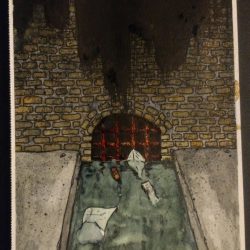
PseudoPod 404: Unforgotten
Show Notes
“I used to work opposite an 18th century building with an odd little window in its back. As I knew the owners, I asked about it, and they weren’t aware that there was even a window – the room had been bricked up many years before and forgotten about. As I wondered what might be in the room, the story came to me.”
Get Matt Wallace’s Slingers books for FREE! Direct links to Book 1, Book 2, Book 3 and Book 4. Book 5, “Slingers: Savage Weapons” is out October 8.
Please consider helping out P.G. Holyfield’s family here.
Unforgotten
by Christopher Fowler
‘I don’t know why they had to turn the fucking lights off,’ moaned Marrick as he and Jonathan passed beneath the cracked AIKO sign and entered the ground floor of the building. ‘Look at it out there, ten in the morning and you’d think it was fucking midnight. Did you bring a torch?’
‘Yes. The main staircase is to the rear of this room.’ Jonathan clicked on the flashlight and raised its beam. The showroom had been stripped to a few piles of mildewed carpet tiles and some battered old shelf units. It smelled bad – damp and sickly. From far above them came the drone of heavy rain and the warble of sheltering pigeons. They reached the foot of the stairs and started up.
‘I wanna make sure they cleared everything out. Barney couldn’t get here this morning, his wife’s sick or something.’ Barney was an ex-bouncer and former prison warden whose aggressive temperament perfectly qualified him for his position as Marrick’s site manager. Unpleasant things happened in Marrick’s company that Jonathan did not know about, that he could not allow himself to discover. Not if he wanted to keep his job and his sanity.
Although Marrick was young, he was considerably overweight; the stairs were already defeating him. He reached the second-floor landing and looked up through the centre of the stairwell, catching his breath. ‘You can check out the top two floors, Jon, make sure we ain’t got any squatters in. Fucking hell, it stinks in here.’
Jonathan stopped on the staircase and stared out of the rain-streaked window into the centre of the block, where the backs of the buildings met.
Rooms. Something odd about the rooms. He studied the brick walls of the courtyard formed by the other properties. He felt as if he had a cold coming on. Getting his jacket so wet hadn’t helped matters. He should have bought himself a new umbrella. He sneezed hard, wiped his nose on a tissue. Spots of dark blood, a crimson constellation. He looked from the window again. The bricks. That’s what it was. The bricks to the right of the window. They were in the wrong place. There should have been an empty space there. It was marked on the map, but not there from the window.
There was one room too many.




